Political families, India
(→1984-2016: disagreements within families) |
(→Disagreements within families) |
||
| Line 254: | Line 254: | ||
Raj Thackeray resigned from his uncle Bal Thackeray's party in 2006 and went on to form the Maharashtra Navnirman Sena. He had complained about being sidelined in the party and said “all I had asked for was respect (from `Matoshree', the Bandra residence of Thackeray and his son, Uddhav).All I got was insult and humiliation“ | Raj Thackeray resigned from his uncle Bal Thackeray's party in 2006 and went on to form the Maharashtra Navnirman Sena. He had complained about being sidelined in the party and said “all I had asked for was respect (from `Matoshree', the Bandra residence of Thackeray and his son, Uddhav).All I got was insult and humiliation“ | ||
| − | [[Category:India|F POLITICAL FAMILIES, INDIAPOLITICAL FAMILIES, INDIAPOLITICAL FAMILIES, INDIAPOLITICAL FAMILIES, INDIA | + | ===As in 2022=== |
| + | [https://epaper.timesgroup.com/article-share?article=13_02_2022_021_003_cap_TOI Himanshi Dhawan, February 13, 2022: ''The Times of India''] | ||
| + | |||
| + | The poll bugle has sounded, and the spotlight is on political families divided by party lines. Bahus have jumped ship, brothers have become rivals and even bachchas have chosen a different political path, leading to a volatile mix of cold wars and heated words. | ||
| + | Sometimes it gets quite ugly. Take Uttar Pradesh’s Bidhuna constituency where daughter Riya Shakya accused her relatives of abducting her unwell father and sitting BJP MLA Vinay Shakya in a video released on social media. Father Vinay has switched sides to Samajwadi Party and issued a video to refute these claims. Father and daughter will now contest against each other as 25-year-old Riya has been given a ticket by BJP. | ||
| + | In Punjab’s Qadian constituency, the white multi-storeyed Bajwa kothi (bungalow) where Rajya Sabha MP and Congress leader Partap Singh Bajwa lives with his extended family, including younger brother Fatehjang Singh, always had a Congress flag at high mast. A month ago the same house had two flags fluttering—Congress and BJP. The rivalry between the two brothers that was behind doors is now in the open when Fatehjung, currently MLA from Qadian, quit Congress to join BJP. Partap Singh is fighting on a Congress ticket from Qadian while Fatehjung has got a BJP ticket from neighbouring Batala. “I will canvas in Qadian if my party asks me to,” Fatehjung says, throwing the gauntlet, “As a younger brother of a leader I have always felt overshadowed. I have the chance now to show who the real leader of the masses is. ” | ||
| + | |||
| + | The Bajwas have joined the party late (pun intended). Adarsh Shastri, the grandson of former PM and freedom fighter Lal Bahadur Shastri, was working in Apple when he quit his job and joined Aam Aadmi Party in 2013. To say family members, who have been long-time Congress loyalists, were upset would be an understatement. Adarsh was asked to move out of the joint family home by his father. “He said that we can’t have Congress and AAP leaders and workers waiting in the same room. I understood and moved out,” he says. Adarsh continued to be the butt of jokes and banter at every family gathering with both his father and uncle (BJP’s Siddharth Nath Singh) checking on him ever so often to see if he wanted to switch sides. “It was all good natured but there were many jokes at my expense,” he says. So when Adarsh quit AAP to join Congress it was a “double homecoming. ” “My family and I shifted back to our old home and we all live together,” he says. | ||
| + | |||
| + | Amongst the earliest families to have different political affiliations under the same roof were former Congress leader and UP CM Sucheta Kripalani and husband J B Kripalani. The latter had established the Kisan Mazdoor Praja Party (KMPP) in 1950 following differences with PM Jawaharlal Nehru. | ||
| + | |||
| + | An even more high-profile split came when Sanjay Gandhi’s widow Maneka Gandhi left Congress after a fallout with her mother-in-law Indira Gandhi. She joined BJP and to this day any interaction between her son Varun Gandhi and Congress leader Rahul Gandhi draws attention. The two were sworn in to the Lok Sabha in June 2009 and proceeded to greet their aunts across the aisle which made headlines. | ||
| + | |||
| + | Political commentator and author Rasheed Kidwai says that family members sporting different political affiliations have less to do with ideology. “The only permanent interest is family. Very often the split is planned so that different family members stay in different parties and the family’s business remains secure,” he says. | ||
| + | |||
| + | But some relationships have been less than cordial. Differences between Madhavrao Scindia and his mother Rajmata Vijay Raje Scindia are said to have begun around 1972 over the money being spent on Jan Sangh activities and close aide Sardar Angre’s influence on the Rajmata. Rajmata was among the founding members of the Jan Sangh, the precursor to the BJP. Kidwai in his book ‘The House of Scindias: A Saga of Power, Politics and Intrigue’ writes, “Close friends of Madhavrao have claimed that the young maharaja was shocked to see money and jewellery disappearing from Jai Vilas Palace. ” This eventually led Madhavrao to split from his mother and join the Congress. | ||
| + | Kidwai also records an old interview where Madhavrao described his mother as a “highly strung” person. “Once she said that I should have been trampled under the foot of an elephant. ” The Rajmata blamed Madhavrao’s wife for the family rift, according to Kidwai. “His wife could not bear his proximity to me. So she caused the rift,” she reportedly said. The rivalry has carried on to the next generation, says Kidwai. “From 2001 to 2020, aunt Yashodhara and Jyotiraditya remained locked in a fight for their control over the political turf, each claiming to be the true inheritor of the Scindia legacy. In 2017, Yashodhara’s son’s wedding reception was planned at Gwalior’s Jai Vilas Palace. But the venue had to be abruptly changed to Usha Kiran Palace Hotel as somebody had mischievously watered the lawns of Rani Mahal, making it unfit to hold a reception. Sources close to Yashodhara pointed a finger at Jyotiraditya, who, as head of the Scindia family, has employees reporting directly to him. ” Jyotiraditya’s “ghar wapsi” to the BJP from the Congress has done little to bury the hatchet. | ||
| + | |||
| + | Not all relationships are acrimonious. Former Bolangir MP and part of the Odisha royal family Kalikesh Singh Deo is with the BJD while his uncle has been with BJP for many decades now. Kalikesh has, in fact, fought several elections against his sister-in-law Sangeeta. “We are not very close, but we do have to meet at the harvest festival of Nuakhai Johar for some rituals. The otherwise solemn ceremony turns into a media circus with rumours of me quitting the party to join BJP. Fortunately, it has become a joke in my party and no one takes this seriously,” Kalikesh says. | ||
| + | |||
| + | Former Rajya Sabha MP and Congress leader Rajeev Shukla, who is married to BJP minister Ravi Shankar Prasad’s sister, says that they have succeeded in keeping the political and personal apart. But the legendary trope of jija-saala (brothers-in-law) in Indian families has been the subject of much entertainment in Parliament and for TV debates. “If he made a remark against the treasury benches, I would rise in protest and parliamentarians would have a good laugh at our expense. Even the TV channels would provoke us into fights,” Shukla says, adding that finally Prasad put his foot down and refused to participate in TV discussions that included Shukla. The leg pulling extends to family gatherings too. | ||
| + | |||
| + | But what about after the polls are over? Punjab’s Fatehjung has not met his brother since he broke rank. “Maybe after the election, we will discuss our win or loss over a cup of tea,” he says. | ||
| + | |||
| + | [[Category:India|F POLITICAL FAMILIES, INDIAPOLITICAL FAMILIES, INDIAPOLITICAL FAMILIES, INDIAPOLITICAL FAMILIES, INDIAPOLITICAL FAMILIES, INDIA | ||
POLITICAL FAMILIES, INDIA]] | POLITICAL FAMILIES, INDIA]] | ||
| − | [[Category:Pages with broken file links|POLITICAL FAMILIES, INDIA | + | [[Category:Pages with broken file links|POLITICAL FAMILIES, INDIAPOLITICAL FAMILIES, INDIA |
POLITICAL FAMILIES, INDIA]] | POLITICAL FAMILIES, INDIA]] | ||
| − | [[Category:Politics|F POLITICAL FAMILIES, INDIAPOLITICAL FAMILIES, INDIAPOLITICAL FAMILIES, INDIAPOLITICAL FAMILIES, INDIA | + | [[Category:Politics|F POLITICAL FAMILIES, INDIAPOLITICAL FAMILIES, INDIAPOLITICAL FAMILIES, INDIAPOLITICAL FAMILIES, INDIAPOLITICAL FAMILIES, INDIA |
POLITICAL FAMILIES, INDIA]] | POLITICAL FAMILIES, INDIA]] | ||
Revision as of 22:01, 27 February 2022
This is a collection of articles archived for the excellence of their content. |
Chief Ministerships staying within the family
Till 2021 July
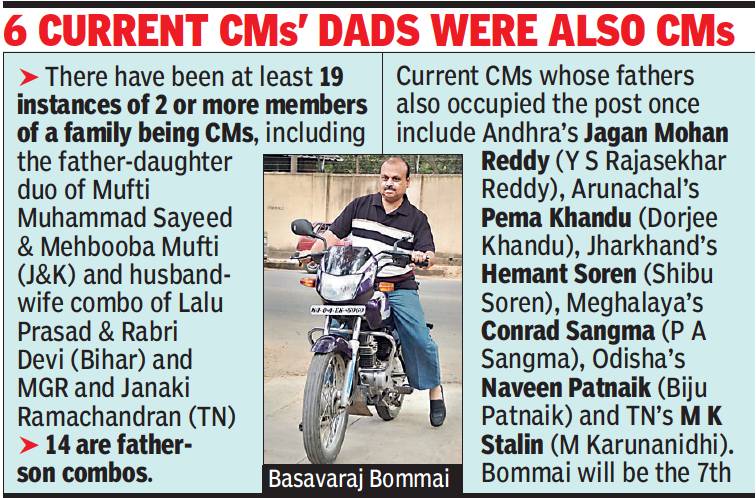
From: Anil Gejji, July 28, 2021: The Times of India
See graphic:
Chief Ministers who were parent- child or spouses, Till 2021 July
Political dynasties: the pluses, minuses
The main political dynasties of India
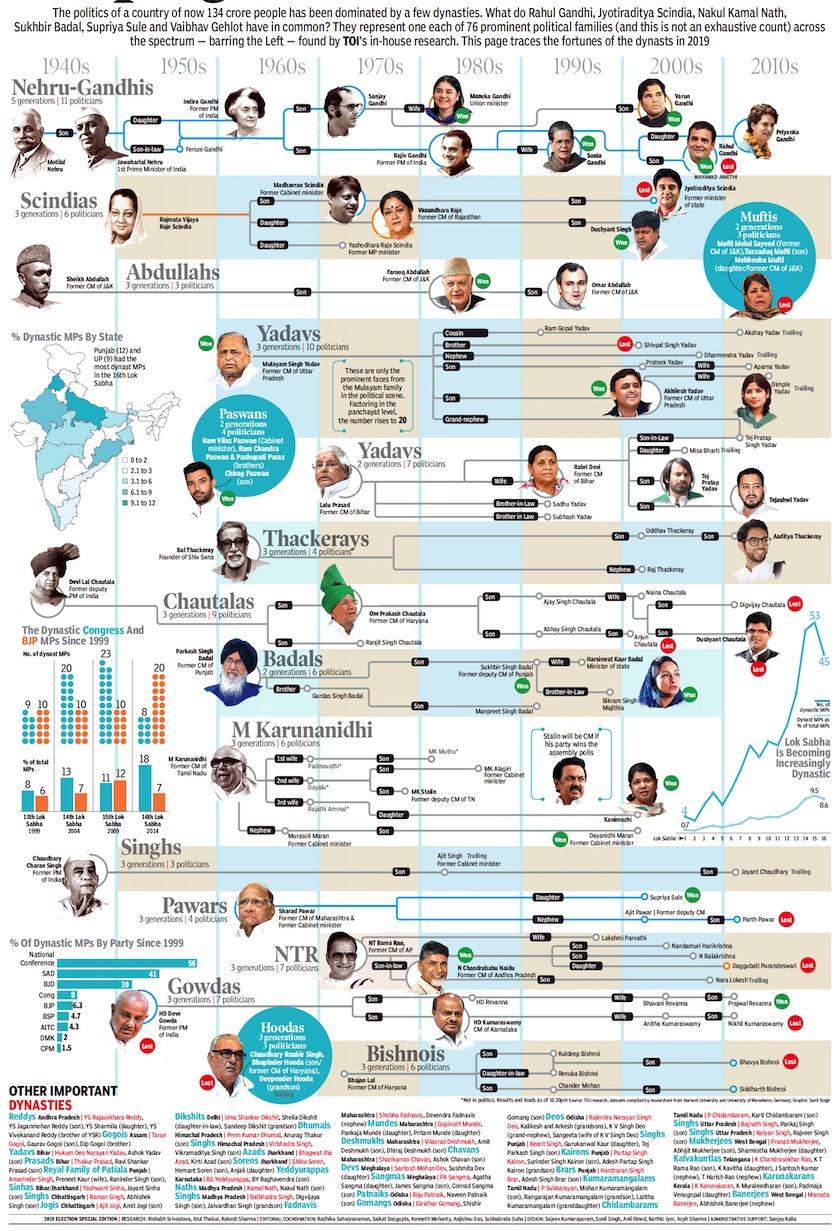
Dynastic Congress and BJP MPs, 1999-2019
From: May 24, 2019: The Times of India
See graphic, '1940s-2019: The main political dynasties of India
Dynastic Congress and BJP MPs, 1999-2019 '
2016: an NYU study

The Times of India, Aug 07 2016
New studies on India's political dynasties busts many assumptions
The Nehru-Gandhis, the Badals, the Abdullahs, the Yadavs, the Scindias -what is it about India's political soil that lets so many family trees thrive?
It's because of a lingering feudalism, say some. It is because of our easy acceptance of hereditary occupations, say others.
But though dynasties in India have been described in history and biography , the phenomenon has never been empirically analysed. A new set of data-driven and theoretically ambitious studies, led by New York University political scientist Kanchan Chandra, is the first to actually study how dynasty and democracy interact. Their book, `Democratic Dynasties: State, Party and Family in Contemporary Indian Politics', has put the skids under much of our popular wisdom.
Dynasty is a paradox, it both hurts and furthers democracy
Dynasties, as we instinctively know, are a violation of political equality because they create entry barriers to outsiders.The data shows that across parties, dynasty logic entrenches forward caste privilege. And yet, they also have collateral benefits that deepen democracy , by opening avenues for women, young people, Muslims and other social groups who don't have an easy way up our given political structures. It is not an ideal route, but dynasties seem to have worked like quotas for the representation of these groups, suggests Chandra.
Party and state set-ups, not feudal charisma encourages dynasties
Indian dynasties are a product of its democracy; former royals and feudal notables account for barely 3% across the last three Lok Sabhas. The Scindias are, in fact, an exception in how they adapted to electoral politics.Voters do not particularly favour dynasts, and they themselves frame their electoral appeals in modern terms, to convey credibility and service rather than entitlement. Also, contrary to popular fears, families do not maintain a tight grip over a constituency; only 5% of parliamentary constituen cies have been continuously represented by a dynastic MP between 2004 and 2014.Dynastic and non-dynastic MPs often switch places in the same constituencies.
So what drives the forming and strengthening of dynasties? Two things, says Chandra -the fact that political office is more attractive than ever before, and the organisational weakness of parties (the lack of clear rules in ticket al location and the assurance of loy alty in sticking with a family member). This is why, even leaders stub bornly resis tant to dynasty like Mamata Banerjee, for instance -can end up allowing it.
Dynasties are pervasive around the world; India isn't unique or extreme
With dynasts occupying 20% of the 2004 Lok Sabha, 30% of the 2009 Lok Sabha and 22% of the 2014 one, India is definitely among the more dynasty-loving nations, but it is in the same league as Japan, Iceland or Ireland, where between a third and a fourth of the legislators had helpful family connections. It is much less dynastic than the Philippines, for instance, where dynasties account for a full 50%. Countries on the lower end are Belgium, Israel, and the US, with 6 to 11%, and Canada where only 3% of the legislators were dynasts. Of course, some nations have institutionalised space for ruling families and aristocrats, like the UK, Sweden, Thailand, Zambia and so on.
Discords/ tiffs within political families
... in 10 political families/ 1911-2015
India Today April 27, 2015
Damayanti Datta
10 political family tiffs that have often turned ugly
A look at slugfests in political families that often turned disturbing
As the Gandhi vs Gandhi clamour hots up in Congress, a look at slugfests in political families that often turned disturbing.
INC President Sonia Gandhi vs son Rahul GandhI
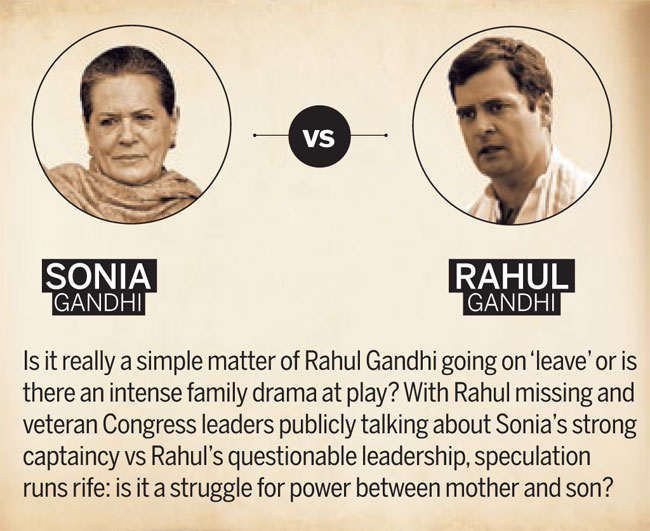
This is about Mr Rahul Gandhi's sudden, unexplained 'leave' of absence in 2015.;
From: Damayanti Datta, April 27, 2015: India Today
See graphic:
Sonia Gandhi vs Rahul Gandhi
This is about Mr Rahul Gandhi's sudden, unexplained 'leave' of absence in 2015.
Mahatma Gandhi vs eldest son Harilal Mohandas Gandhi

From: Damayanti Datta, April 27, 2015: India Today
See graphic:
Mahatma Gandhi vs Harilal Gandhi
Indira Gandhi's husband Feroze Gandhi vs Jawaharlal Nehru

From: Damayanti Datta, April 27, 2015:India Today
See graphic:
Firoz Gandhi vs Pt. Jawaharlal Nehru
Indira Gandhi vs Maneka Gandhi

From: Damayanti Datta, April 27, 2015:India Today
See graphic:
Indira Gandhi vs Maneka Gandhi
Samajwadi Party chief Mulayam Singh Yadav vs son and Uttar Pradesh CM Akhilesh Yadav
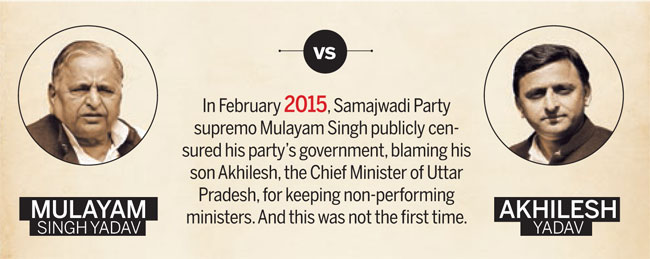
From: Damayanti Datta, April 27, 2015:India Today
See graphic
Mulayam Singh Yadav vs Akhilesh Yadav
See also Samajwadi Party
Former PM H.D. Deve Gowda vs younger son H.D. Kumaraswamy

From: Damayanti Datta, April 27, 2015:India Today
See graphic:
Former Prime Minister of India- Haradanahalli Doddegowda Deve Gowda (H. D. Deve Gowda)
Madhavrao Scindia vs mother Vijayaraje Scindia

From: Damayanti Datta, April 27, 2015: India Today
See graphic:
Scindia family
Shiv Sena founder Balasaheb Thackeray vs nephew Raj Thackeray

From: Damayanti Datta, April 27, 2015:India Today
See graphic
Thackeray family
DMK chief M. Karunanidhi vs elder son M.K. Alagiri
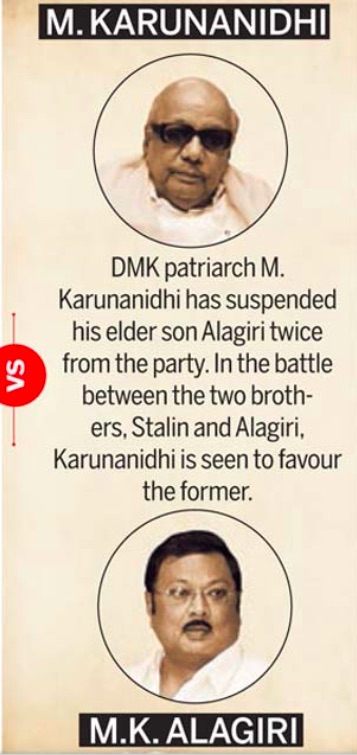
From: Damayanti Datta, April 27, 2015: India Today
See graphic
DMK family
Leader of the People's Party of Punjab, Manpreet Singh Badal vs uncle Parkash Singh Badal
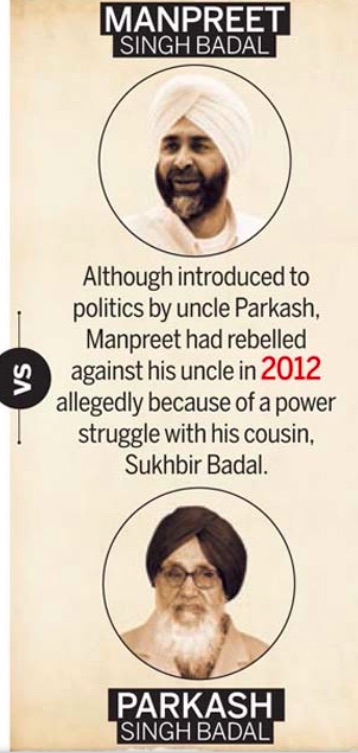
From: Damayanti Datta, April 27, 2015: India Today
See graphic:
Badal family
The Thackeray, Pawar families

From: Nov 25, 2019: The Times of India
See graphic:
The Thackeray, Pawar families, As in 2019 Nov
B
Vaibhav Purandare, Nov 29, 2019: The Times of India
Key Highlights
Bal Thackeray always referred to Pawar as "Sharad babu" in person, their families dined together and looked after each other
Pawar played a key role in getting Sena to back Congress' Pratibha Patil and Pranab Mukherjee for President
At the time of the Sena patriarch's final illness in 2012, it was Pawar who often gave Uddhav strength
One evening in October 1966, a round-faced, portly man dressed in white plonked himself on one of the benches that draw a neat ring around Shiva ji Park in central Mumbai. He was not out for fresh air, but for a ringside view of a rally organised by Shiv Sena, a new sons-of-the-soil outfit launched by a former cartoonist, Bal Thackeray. As Thackeray launched into a tirade against migrants flocking to Mumbai in his first speech, the man on the bench, Sharad Pawar, a Congress activist from Baramati, listened intently.
Not that Pawar, who started out as a Youth Congress worker and looked up to YB Chavan as his icon, agreed with what Thackeray said. He stuck to his party's stand of "unity in diversity," but knew the ex-cartoonist was not a man to be ignored. Pawar had, in fact, first met Bal Thackeray before the Sena was formed; Thackeray's father, Prabodhankar, was a public figure who routinely attracted visitors at his Dadar residence, and Bal had developed a reputation of his own with his brushstrokes. So an acquaintance was in place.
After the inaugural Sena rally, the two travelled in different directions politically as the Sena-Congress bonhomie of the late 1960s and early 1970s - forged in their shared opposition to Communists in the city's mill heartland - ended. But a personal rapport endured, developing into a familial bond that has now enabled the late Sena founder's son Uddhav to take over the reins of the state with Pawar as mover of a three-party coalition.
Bal Thackeray always referred to Pawar as "Sharad babu" in person, though in a clear separation between the personal and the political, he dubbed him a "maidyacha pota" (a sack of flour) in speeches. Their families dined together and looked after each other. When Pawar's daughter Supriya was barely a year old, the then Congress leader and his wife Pratibha once had dinner at the Thackerays' new home, after which Pawar said he'd drive back to his hometown in Pune district. Thackeray tried to dissuade him: it was late and Supriya was small, so he urged his "dear friend" to stay back and leave in the morning. Pawar however insisted on going, and by Thackeray's own admission, he was anxious and stayed awake until he'd confirmed over phone that the Pawars had reached safely.
When Pawar, as NCP chief, decided to nominate Supriya to the Rajya Sabha in 2006, the Sena chief rang him up and told him he was annoyed because he'd heard the news from someone else. Pawar tried to explain that there was no way he could get Sena-BJP votes for her as they had their own candidates, but Thackeray persuaded BJP not to put up a saffron alliance candidate against her. "I've known Supriya as a child, and she's played with my children since she was six months old. How could I not see to it that she enters the RS unopposed?" Thackeray asked.
Pawar played a key role in getting Sena to back Congress' Pratibha Patil and Pranab Mukherjee for President, and at the time of the Sena patriarch's final illness in 2012, it was Pawar who often gave Uddhav strength.
This time, the barrier between personal and political has been breached, and Supriya Sule's tweet on Thursday showed the extent of the warmth. "Maa Saheb and Balasaheb -missing you so much today. Both of you should have been here today. They treated me with so much love and affection more than a daughter! Their role in my life will always be special and memorable!" Supriya wrote.
Maharashtra: transition and impatient scions/ 1960s-2019
GenNext's clamour for power and unwillingness to wait for it have resulted in some of Maharashtra's key political families resembling precarious houses of cards as the decks are cleared for the Lok Sabha elections.
The done thing in dynastic politics has always been for youngsters to spend some time learning the ropes in the background or on the sidelines, often in the shadow of the patriarchs. Even if ideologically, compartments ceased to be watertight decades ago, with the Pawar family of Baramati and the Vikhe Patils of Ahmednagar too going off in more than one direction, the core value of gradually climbing up the ladder was not under threat. Now suddenly it is, as a result of overarching ambition and a now-or-never attitude.
And the Pawar and Vikhe Patil dynasties are among the first to have been at the receiving end this poll season. Sharad Pawar initially made it clear he and daughter Supriya Sule would be the only two members of the family contesting the LS polls. But his nephew Ajit's son Parth pressed on, claiming the Maval seat + for himself, until Pawar Sr deftly resolved the issue and gave Parth the go-ahead while withdrawing from the fray himself. And when leader of opposition Radhakrishna Vikhe Patil of Congress failed in his attempts to wrest the Ahmednagar LS seat from NCP in his son Sujay's favour, Sujay quickly joined the BJP + .
Supriya Sule denied on Wednesday that the Parth episode had created a rift in the Pawar family. "For me and Ajitdada, family ties are of greater importance than anything else. Blood is thicker than the elixir of politics," she said.
However, some seniors are confused and distraught. "Everything is moving at a frenetic pace. A young politician wants to make it big in too short a span of time by using the family name," a senior NCP functionary said. "A young scion had to spend a couple of years by the side of the patriarch before graduating to bigger opportunities. A panchayat samiti or zilla parishad membership was the first step of the ladder," the functionary said.
The transition of power and political legacy was smooth in many political families in the 1960s, such as the Hireys of Nashik, the Vartaks of Virar, the Vikhe Patils, the Pawars, and the Chavans of Nanded. The Thackeray clan of Mumbai was the first to face open revolt by one of its young members, Raj Thackeray.
Interestingly, the number of Maharashtra leaders who showed no great interest in pushing their kith and kin into politics was impressive. Among them were Congressmen like Yashwantrao Chavan, Vasantdada Patil (his son briefly dabbled in politics before fading into oblivion) and Vasantrao Naik, and opposition stalwarts such as S M Joshi, N G Goray, George Fernandes and Mrinal Gore.
Those who were keen on handing over political legacy to their children took care to groom them. NCP veterans spoke about how Pawar Sr put his daughter through the paces when she decided to join the family vocation. Sule, now an NCP leader, said, "My father made me go from one Mantralaya department to the other with files to study the mechanism of the state administration when I took up the issue of women's empowerment. Being a member of a political family means more hard work."
Gopinath Munde would make daughter Pankaja sit next to him during media interviews or while studying papers of a complicated development issue, it is said.
The political climate began to undergo a change after Raj Thackeray's revolt against Matoshree, making Maharashtra's netas aware of GenNext's stirrings.
Even today, however, many upcoming scions are eager to hone their political skills, among them Yuva Sena chief Aditya Thackeray, Amit Thackeray, son of MNS chief Raj Thackeray and Narayan Rane's son Nitesh.
Then there are those like Milind Deora, Praniti Shinde and Amit Deshmukh of the Congress and Poonam Mahajan of the BJP who have succeeded in good measure in stepping out of their father's shadow. "But some refuse to be low-profile. An expensive lifestyle and vanity may lead to a disconnect between young politicians and grassroot workers of a party," said a political commentator.
While Sule's view is that the young generation should be encouraged to join politics, she thinks they should put their shoulder to the wheel. "They can't keep flaunting their family card," she said.
Amit Thackeray feels gone are the days when members of a political clan could "bask in borrowed glory". "Nothing wrong if a politician's son or daughter joins their father. But they will have to prove their credentials by bonding with people and not just by hankering after an MP seat or ministerial post," he said.
Disagreements within families
1984-2016
NETA FAMILY FEUDS, Oct 25 2016 : The Times of India
Yadavs are the latest in the list of political families facing a split as generations clash over way ahead for the party & roles they play
AIADMK
I n 1984, when MG Ramachandran was incapacitated after a stroke, Jayalalithaa reportedly tried to take over the position of CM. After MGR's death in Dec 1987, AIADMK split into two factions between Janaki (MGR's wife) and Jayalalithaa.Following AIADMK's rout in the 1989 state polls, the faction led by Janaki merged under that led by Jayalalithaa
TDP
In 1995, Chandrababu Naidu staged a coup against party founder NT Rama Rao, replacing him as Andhra's CM. Naidu would later say a “dushta shakti“ (referring to NTR's second wife Lakshmi Parvati) tried to destroy the party and to protect it from the “evil force“ he had to revolt and split TDP. Members of the NTR family supported Naidu. After NTR died of a heart attack in Jan 1996, Parvati floated a rival faction TDP NTR. Both Naidu and she staked claim to NTR's legacy
DMK
Hints from party supremo Karunanidhi that his younger son MK Stalin was to be his political heir sparked tension in the DMK first family as MK Alagiri, Stalin's elder brother, openly vented his ire and accused his father of being “partial“ to his younger brother.
Alagiri was eventually expelled from DMK in 2014 for engaging in “anti party“ activities
Shiv Sena
Raj Thackeray resigned from his uncle Bal Thackeray's party in 2006 and went on to form the Maharashtra Navnirman Sena. He had complained about being sidelined in the party and said “all I had asked for was respect (from `Matoshree', the Bandra residence of Thackeray and his son, Uddhav).All I got was insult and humiliation“
As in 2022
Himanshi Dhawan, February 13, 2022: The Times of India
The poll bugle has sounded, and the spotlight is on political families divided by party lines. Bahus have jumped ship, brothers have become rivals and even bachchas have chosen a different political path, leading to a volatile mix of cold wars and heated words. Sometimes it gets quite ugly. Take Uttar Pradesh’s Bidhuna constituency where daughter Riya Shakya accused her relatives of abducting her unwell father and sitting BJP MLA Vinay Shakya in a video released on social media. Father Vinay has switched sides to Samajwadi Party and issued a video to refute these claims. Father and daughter will now contest against each other as 25-year-old Riya has been given a ticket by BJP. In Punjab’s Qadian constituency, the white multi-storeyed Bajwa kothi (bungalow) where Rajya Sabha MP and Congress leader Partap Singh Bajwa lives with his extended family, including younger brother Fatehjang Singh, always had a Congress flag at high mast. A month ago the same house had two flags fluttering—Congress and BJP. The rivalry between the two brothers that was behind doors is now in the open when Fatehjung, currently MLA from Qadian, quit Congress to join BJP. Partap Singh is fighting on a Congress ticket from Qadian while Fatehjung has got a BJP ticket from neighbouring Batala. “I will canvas in Qadian if my party asks me to,” Fatehjung says, throwing the gauntlet, “As a younger brother of a leader I have always felt overshadowed. I have the chance now to show who the real leader of the masses is. ”
The Bajwas have joined the party late (pun intended). Adarsh Shastri, the grandson of former PM and freedom fighter Lal Bahadur Shastri, was working in Apple when he quit his job and joined Aam Aadmi Party in 2013. To say family members, who have been long-time Congress loyalists, were upset would be an understatement. Adarsh was asked to move out of the joint family home by his father. “He said that we can’t have Congress and AAP leaders and workers waiting in the same room. I understood and moved out,” he says. Adarsh continued to be the butt of jokes and banter at every family gathering with both his father and uncle (BJP’s Siddharth Nath Singh) checking on him ever so often to see if he wanted to switch sides. “It was all good natured but there were many jokes at my expense,” he says. So when Adarsh quit AAP to join Congress it was a “double homecoming. ” “My family and I shifted back to our old home and we all live together,” he says.
Amongst the earliest families to have different political affiliations under the same roof were former Congress leader and UP CM Sucheta Kripalani and husband J B Kripalani. The latter had established the Kisan Mazdoor Praja Party (KMPP) in 1950 following differences with PM Jawaharlal Nehru.
An even more high-profile split came when Sanjay Gandhi’s widow Maneka Gandhi left Congress after a fallout with her mother-in-law Indira Gandhi. She joined BJP and to this day any interaction between her son Varun Gandhi and Congress leader Rahul Gandhi draws attention. The two were sworn in to the Lok Sabha in June 2009 and proceeded to greet their aunts across the aisle which made headlines.
Political commentator and author Rasheed Kidwai says that family members sporting different political affiliations have less to do with ideology. “The only permanent interest is family. Very often the split is planned so that different family members stay in different parties and the family’s business remains secure,” he says.
But some relationships have been less than cordial. Differences between Madhavrao Scindia and his mother Rajmata Vijay Raje Scindia are said to have begun around 1972 over the money being spent on Jan Sangh activities and close aide Sardar Angre’s influence on the Rajmata. Rajmata was among the founding members of the Jan Sangh, the precursor to the BJP. Kidwai in his book ‘The House of Scindias: A Saga of Power, Politics and Intrigue’ writes, “Close friends of Madhavrao have claimed that the young maharaja was shocked to see money and jewellery disappearing from Jai Vilas Palace. ” This eventually led Madhavrao to split from his mother and join the Congress. Kidwai also records an old interview where Madhavrao described his mother as a “highly strung” person. “Once she said that I should have been trampled under the foot of an elephant. ” The Rajmata blamed Madhavrao’s wife for the family rift, according to Kidwai. “His wife could not bear his proximity to me. So she caused the rift,” she reportedly said. The rivalry has carried on to the next generation, says Kidwai. “From 2001 to 2020, aunt Yashodhara and Jyotiraditya remained locked in a fight for their control over the political turf, each claiming to be the true inheritor of the Scindia legacy. In 2017, Yashodhara’s son’s wedding reception was planned at Gwalior’s Jai Vilas Palace. But the venue had to be abruptly changed to Usha Kiran Palace Hotel as somebody had mischievously watered the lawns of Rani Mahal, making it unfit to hold a reception. Sources close to Yashodhara pointed a finger at Jyotiraditya, who, as head of the Scindia family, has employees reporting directly to him. ” Jyotiraditya’s “ghar wapsi” to the BJP from the Congress has done little to bury the hatchet.
Not all relationships are acrimonious. Former Bolangir MP and part of the Odisha royal family Kalikesh Singh Deo is with the BJD while his uncle has been with BJP for many decades now. Kalikesh has, in fact, fought several elections against his sister-in-law Sangeeta. “We are not very close, but we do have to meet at the harvest festival of Nuakhai Johar for some rituals. The otherwise solemn ceremony turns into a media circus with rumours of me quitting the party to join BJP. Fortunately, it has become a joke in my party and no one takes this seriously,” Kalikesh says.
Former Rajya Sabha MP and Congress leader Rajeev Shukla, who is married to BJP minister Ravi Shankar Prasad’s sister, says that they have succeeded in keeping the political and personal apart. But the legendary trope of jija-saala (brothers-in-law) in Indian families has been the subject of much entertainment in Parliament and for TV debates. “If he made a remark against the treasury benches, I would rise in protest and parliamentarians would have a good laugh at our expense. Even the TV channels would provoke us into fights,” Shukla says, adding that finally Prasad put his foot down and refused to participate in TV discussions that included Shukla. The leg pulling extends to family gatherings too.
But what about after the polls are over? Punjab’s Fatehjung has not met his brother since he broke rank. “Maybe after the election, we will discuss our win or loss over a cup of tea,” he says.